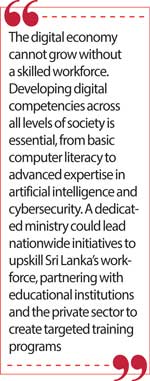Wednesday Feb 18, 2026
Wednesday Feb 18, 2026
Friday, 27 December 2024 00:26 - - {{hitsCtrl.values.hits}}

A Ministry of Digital Economy could drive the expansion of e-governance, enabling citizens to access essential services like tax payments, business registrations, and public procurement online

The establishment of a Ministry of Digital Economy in Sri Lanka signals a bold step towards embracing the opportunities of the 21st century. This strategic move aligns the country with global trends and positions it to harness the transformative power of digital technologies. As nations worldwide increasingly depend on digital economies for growth and innovation, Sri Lanka’s decision to create this focused ministry is a testament to its commitment to modernising its economic landscape.
In an era where technology drives economic progress, the digital economy is no longer an option, it is a necessity. Nations across the globe are leveraging digital platforms and innovations to accelerate growth, improve governance, and create jobs. Sri Lanka, with its strategic location and a talented workforce, stands at a crucial juncture to harness this potential. A bold step in this direction is the country’s goal of building a $ 15 billion digital economy, alongside the establishment of a dedicated Ministry of Digital Economy to lead this transformation.
The digital economy, encompassing activities driven by digital technologies such as e-commerce, fintech, artificial intelligence, and cloud computing, is reshaping the global landscape. In developed nations, it contributes significantly to GDP, while for developing economies like Sri Lanka, it represents a game-changing opportunity. At a time when Sri Lanka is navigating economic recovery, a thriving digital economy could unlock unprecedented growth, attract investment, and empower citizens.
Focused and strategic approach
Achieving a $ 15 billion digital economy requires a focused and strategic approach. The creation of a Ministry of Digital Economy is crucial to driving this agenda forward. A centralised authority dedicated to the digital economy would align policies across sectors and create a unified strategy for digital transformation. With such a ministry, Sri Lanka could better coordinate efforts among government bodies, private enterprises, and international organisations to ensure impactful initiatives.
 The foundation of a digital economy lies in robust infrastructure. Investments in high-speed internet, 5G networks, and digital public platforms are essential. A Ministry of Digital Economy could prioritise these efforts, ensuring equitable access to digital infrastructure across both urban and rural areas. By bridging the digital divide, the Government can empower all citizens to participate in and benefit from this new era of economic activity.
The foundation of a digital economy lies in robust infrastructure. Investments in high-speed internet, 5G networks, and digital public platforms are essential. A Ministry of Digital Economy could prioritise these efforts, ensuring equitable access to digital infrastructure across both urban and rural areas. By bridging the digital divide, the Government can empower all citizens to participate in and benefit from this new era of economic activity.
Sri Lanka’s micro, small, and medium-sized enterprises (MSMEs), which form the backbone of the economy, are vital to achieving the $ 15 billion target. Many MSMEs, however, lack the tools and knowledge to embrace digitalisation. A Ministry of Digital Economy could spearhead initiatives to train businesses, provide access to affordable digital tools, and open pathways for these enterprises to access global markets. Additionally, startups could benefit from tailored support programs, including funding and mentorship, fostering innovation and entrepreneurship that drives growth.
Financial inclusion
Financial inclusion will be another critical factor in achieving the $ 15 billion digital economy. Despite progress in the financial sector, many Sri Lankans remain unbanked or underbanked. Fintech solutions and digital payment systems can address these gaps, integrating more people into the formal economy. A Ministry of Digital Economy could collaborate with fintech companies to expand mobile banking, promote digital wallets, and implement microcredit schemes, ensuring financial services reach even the most underserved communities.
The digital economy cannot grow without a skilled workforce. Developing digital competencies across all levels of society is essential, from basic computer literacy to advanced expertise in artificial intelligence and cybersecurity. A dedicated ministry could lead nationwide initiatives to upskill Sri Lanka’s workforce, partnering with educational institutions and the private sector to create targeted training programs.
E-governance and digital public services are vital for efficiency and transparency. Digital platforms can simplify Government processes, reduce corruption, and improve service delivery. A Ministry of Digital Economy could drive the expansion of e-governance, enabling citizens to access essential services like tax payments, business registrations, and public procurement online. These advancements would not only increase efficiency but also enhance public trust in Government institutions.
Sri Lanka is strategically positioned to become a regional hub for technology and innovation. With its location bridging South Asia and Southeast Asia, along with a growing tech-savvy workforce, the country has the potential to attract significant foreign investment in IT services, software development, and digital innovation. Establishing a Ministry of Digital Economy signals Sri Lanka’s commitment to digital transformation, strengthening investor confidence and fostering global partnerships.
Cyberattacks and data breaches
As the digital economy grows, so do associated risks like cyberattacks and data breaches. To achieve its $ 15 billion goal, Sri Lanka must prioritise cybersecurity and data protection. A dedicated ministry could lead the way in creating robust frameworks to safeguard businesses and citizens from digital threats. This is essential for building trust in digital platforms and ensuring long-term sustainability.
The COVID-19 pandemic highlighted the importance of digital solutions in maintaining economic resilience. Remote work, e-learning, telemedicine, and e-commerce played pivotal roles in helping economies weather the crisis. A Ministry of Digital Economy could integrate digital technologies into key sectors like agriculture, healthcare, and education, ensuring Sri Lanka is well-prepared for future disruptions.
 Achieving a $ 15 billion digital economy will have a transformative impact on Sri Lanka. It will boost exports through e-commerce and digital services, create jobs in technology-driven industries, improve governance and public service delivery, and enhance financial stability. Moreover, it will drive inclusive development by empowering marginalised communities, women, and youth, while also supporting environmental sustainability through efficient resource utilisation and reduced carbon footprints.
Achieving a $ 15 billion digital economy will have a transformative impact on Sri Lanka. It will boost exports through e-commerce and digital services, create jobs in technology-driven industries, improve governance and public service delivery, and enhance financial stability. Moreover, it will drive inclusive development by empowering marginalised communities, women, and youth, while also supporting environmental sustainability through efficient resource utilisation and reduced carbon footprints.
Challenges
However, building a thriving digital economy is not without challenges. Sri Lanka must address issues such as inadequate digital infrastructure, limited technology access in rural areas, and resistance to change in traditional sectors. Overcoming these obstacles will require significant investments in broadband expansion, 5G deployment, and digital public infrastructure. National campaigns to improve digital literacy, encourage public-private partnerships, and engage international expertise will be critical to success.
The establishment of a Ministry of Digital Economy is more than a policy shift—it is a bold declaration of intent. It symbolises Sri Lanka’s commitment to embracing the future, positioning itself as a competitive player in the global digital economy. By focusing on achieving a $ 15 billion digital economy, the nation can unlock new avenues of growth, create jobs, and improve the quality of life for its citizens. With visionary leadership and a coordinated effort, Sri Lanka can harness the power of the digital economy to build a resilient, inclusive, and prosperous future.
(The writer is Chairman, Federation of Information Technology Industry Sri Lanka (FITIS), and a seasoned, vibrant and result-oriented professional with 30 years of rich experience covering digital, ICT solutions, marketing, innovation, development, integration and market development with global prestigious organisations.)